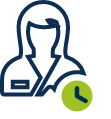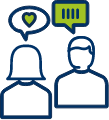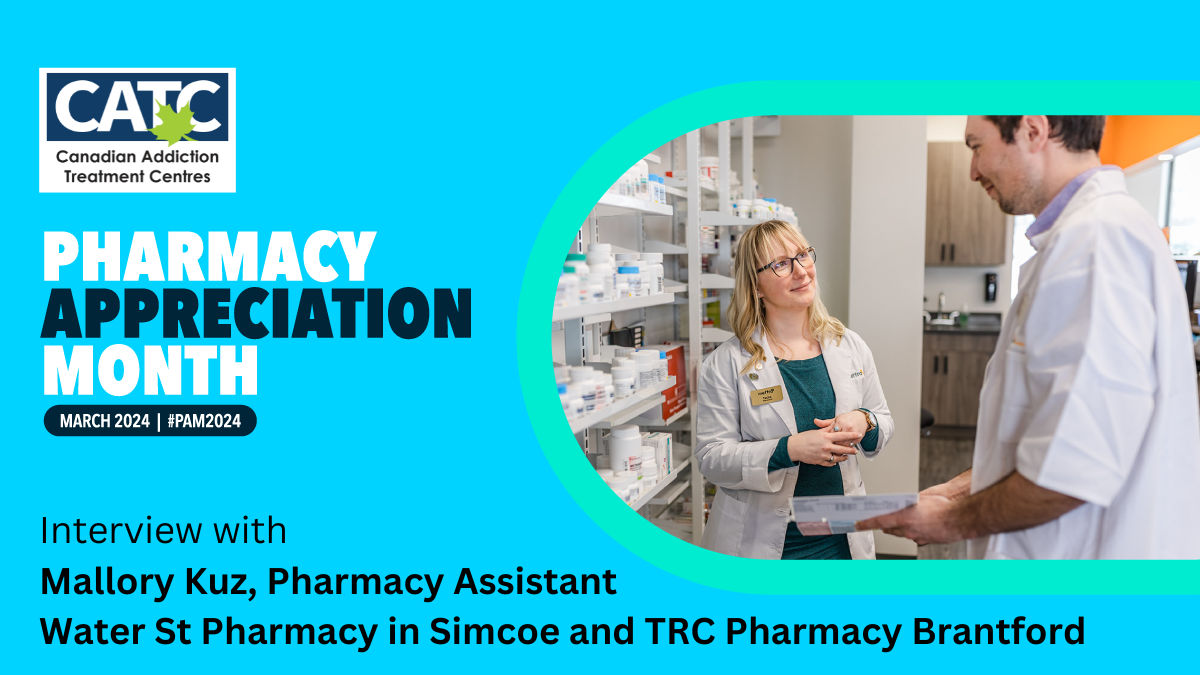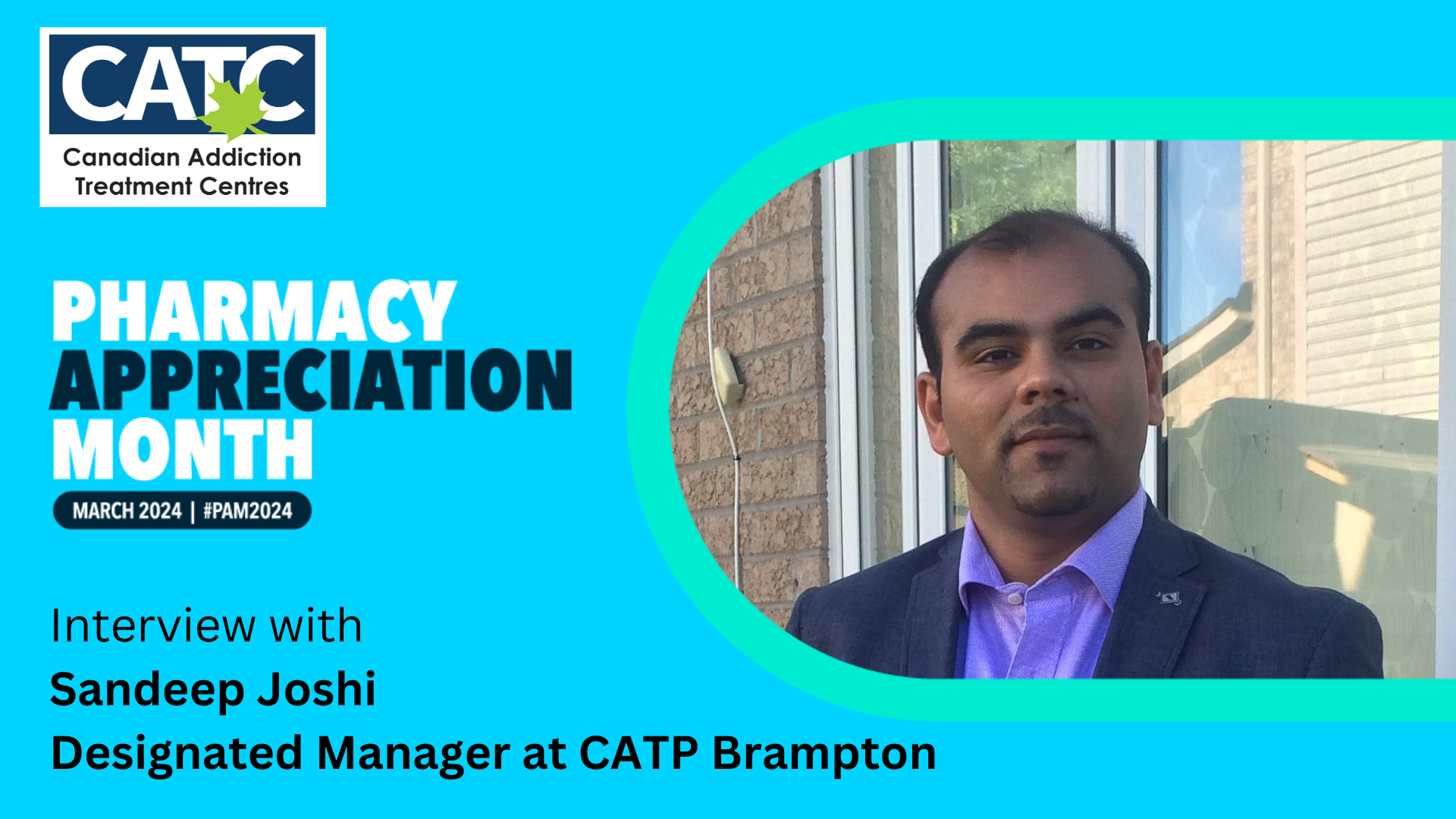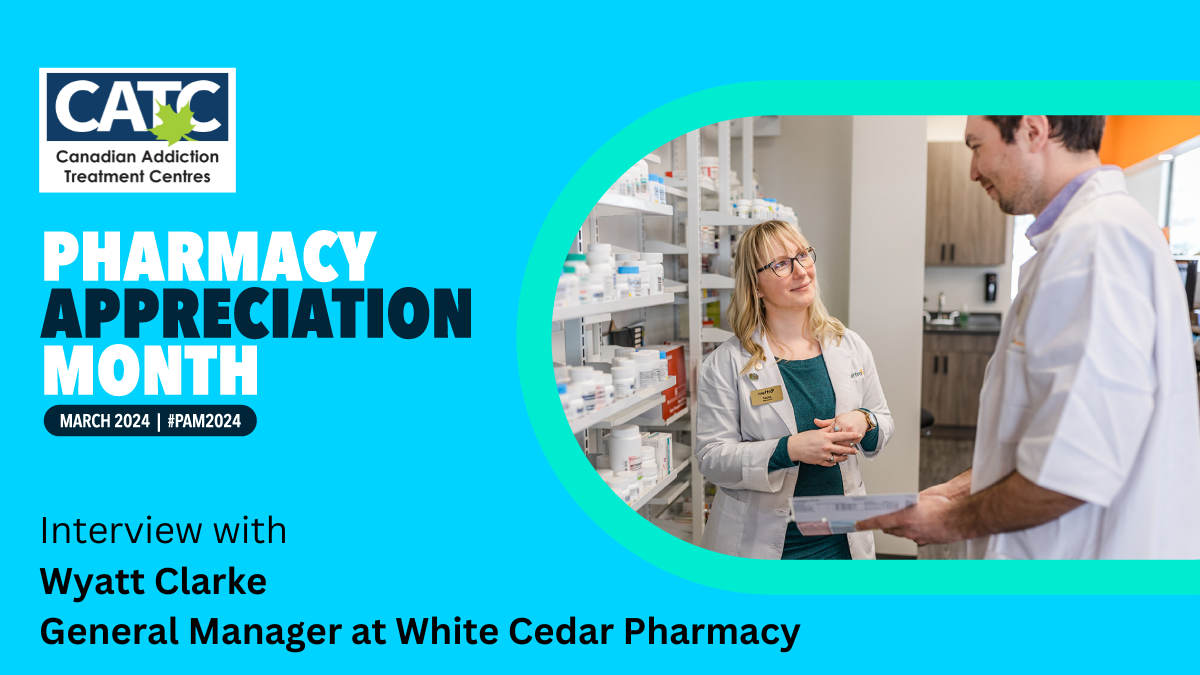
PAM 2024 Interview with Wyatt Clarke
During Pharmacy Appreciation Month, we spoke with Wyatt Clarke, General Manager at White Cedar Pharmacy, to hear his perspective on how CATC’s integrated pharmacy services […]
Continue ReadingThe power of pharmacy in integrated opioid addiction treatment.
Learn MoreCATC provides best-in-class addiction care to our patients, offering a judgment-free, compassionate space for people to heal.
Get Help NowWe're committed to increasing our capacity to deliver accessible, culturally-appropriate treatment for addictions.
Learn MoreView the location convenient for you and the hours of operation.
View Our Locations and HoursThere’s no one-size-fits-all approach to recovery from substance use disorder or addictive behaviours. As Canada’s largest provider of compassionate, effective addiction care for nearly 30 years, we offer evidence-based programs that meet people where they are—and get them to where they want to be.
From rapid access outpatient treatment for opioid use disorder to intensive inpatient addiction treatment and medical detox, our national care team are champions in our patients’ recovery, at any stage of their journey.
CATC has over 75 convenient addiction treatment centres throughout Ontario, New Brunswick and British Columbia to help you or your family member get started on their recovery journey.
Learn MoreMethadone (usually in liquid form) is a full opioid agonist that provides relief from withdrawal symptoms and cravings. Because it has no ceiling effect, it is useful for patients who are dependent on high doses of opioid and/or strong opioids like fentanyl.
Learn MoreBuprenorphine/Naloxone (tablet form, brand name Suboxone®) is a partial opioid agonist that helps relieve withdrawal symptoms. Because it has a ceiling effect, it offers a good safety profile.
Learn MoreHepatitis C, a blood-borne virus that affects the liver, can be cured. New treatment options are as simple as taking one pill a day for 8-12 weeks with little or no side effects.
Learn MoreOur 4 intensive inpatient addiction treatment centres throughout Ontario (often called “residential treatment centres”) offer a safe healing environment, giving you all of the skills and specialized care you need to reach your recovery goals. With a full suite of client supports, including lifelong aftercare, sober living coaching, therapy for underlying mental health issues and medically-supervised detox, our compassionate teams are here to help when you or your loved one are ready to start your journey in recovery from substance use and addiction.
Inpatient Recovery ProgramsOur completely online addiction recovery program puts all the help you need to reach your goals at your fingertips, on a schedule that works for you. Connect with qualified professionals on a secure virtual platform that protects your privacy, and choose from a variety of flexible options to recover from substance use disorder or behavioural addictions.
Online Addiction TreatmentCATC has over 75 convenient addiction treatment centres throughout Ontario, New Brunswick and British Columbia to help you or your family member get started on their recovery journey.
Methadone (usually in liquid form) is a full opioid agonist that provides relief from withdrawal symptoms and cravings. Because it has no ceiling effect, it is useful for patients who are dependent on high doses of opioid and/or strong opioids like fentanyl.
Buprenorphine/Naloxone (tablet form, brand name Suboxone®) is a partial opioid agonist that helps relieve withdrawal symptoms. Because it has a ceiling effect, it offers a good safety profile.
Hepatitis C, a blood-borne virus that affects the liver, can be cured. New treatment options are as simple as taking one pill a day for 8-12 weeks with little or no side effects.
Our 4 intensive inpatient addiction treatment centres throughout Ontario (often called “residential treatment centres”) offer a safe healing environment, giving you all of the skills and specialized care you need to reach your recovery goals. With a full suite of client supports, including lifelong aftercare, sober living coaching, therapy for underlying mental health issues and medically-supervised detox, our compassionate teams are here to help when you or your loved one are ready to start your journey in recovery from substance use and addiction.
Our completely online addiction recovery program puts all the help you need to reach your goals at your fingertips, on a schedule that works for you. Connect with qualified professionals on a secure virtual platform that protects your privacy, and choose from a variety of flexible options to recover from substance use disorder or behavioural addictions.
Each of our Addiction Treatment Centres is conveniently located, clean, and welcoming to all. We offer both Methadone and Buprenorphine/Naloxone (Suboxone®) medication-assisted therapy, as well as Hepatitis C diagnostic and treatment services. Patients will have access to harm reduction services like Needle Exchange Programs and Naloxone kits. Where possible, we have partnered with community agencies to provide additional services, including counseling, housing support, job banks, tax filing assistance, primary care, etc.
View All LocationsOur Comprehensive Treatment Programs include the use of Methadone or Buprenorphine/Naloxone (Suboxone®) to help patients manage withdrawal and cravings that so often lead to relapse. Our patient-specific treatment plans address not only the physical dependency to opioids, but also the unique mental, emotional and social toll addiction typically takes on our patients.
Learn More About UsMy Husband and I have been apart of the program at the Ottawa West OATC for over 2 years now, and we are beyond grateful for the progress it has given us in our recovery’s. Since becoming a part of the program, we have met many staff members, nurses & Doctors.. who have all been great. Colleen & Tanisha specifically, who work the front have been beyond wonderful, they are just lovely people in general, and they always make it enjoyable to come in for our weekly visits to the clinic. After over 2 years of treatment, I’m happy to say we’re officially weening off our medications, and with the help of all the supportive staff.. we have had a successful road to recovery! If you’re looking to begin your process to recovery, I highly recommend OATC west, and I hope your experience is as life changing as ours has been. Thank you Tanisha & Colleen for your welcoming and helpful nature, and thank you OATC!!!
– OATC Ottawa West Patient
This clinic is a very great safe respectful environment to go to for help to beat your battle against drug addiction!!!!
– OATC Sudbury Patient
If you have chronic pain or an opiate addiction this O.A.T.C Clinic is second to none. The staff counsellors and doctors are the best in their field. The compassion and bed side manner seems to be infectious here. I live 88 kilometers away and go to this clinic by choice because of the people there. There is a clinic in the town I live in and one 33 kilometers away the other way. I don’t know how the staff and medical professionals at the other locations so I can’t give my opinion. But Sudbury is hands down the best.
– OATC Sudbury Patient
They have very friendly and caring staff!!! Naturally, people that are addicts (like myself (but in recovery) would have negative comments because they are still active addicts that aren’t getting what they want. If you are there to help yourself, whether it be for addiction or pain management so you don’t go back to abusing drugs….they are very supportive and caring. They will work with you and do their best to accommodate you and help you!!! I am very satisfied and grateful for the care and the support and am receiving from this Clinic!!!
– OATC Sudbury Patient
I am a new patient here. The staff are extremely kind and friendly they got me in fast and efficiently. The whole place is well organized, clean, and welcoming. I would give 6 stars if I could.
– OATC Sudbury Patient
My spouse is a patient here, I am not. The medical staff here are still welcoming and kind towards me, so much so that i feel as if I was a patient there myself. I feel comfortable with my spouse going here and confident they have her best interests in mind and help her achieve her goals in a supportive kind manner.
– OATC Sudbury Patient
Staff are very professional and compassionate. They are doing miracles for people that want to stay clean.
– OATC Sault Ste. Marie Patient
I don’t care what anyone says but treat people with respect you get respect, these ladies do go above and beyond their job! If it wasn’t for them I’m sure I would have had 3 orphaned children so say what you want but this place saved my life PERIOD
– OATC Sault Ste. Marie Patient
The staff both at the O.A.T.C and the adjoining pharmacy are some of the warmest, kindest, and most caring people that I have ever encountered. Unfortunately, not everyone who goes there is kind and respectful, so I have seen them get yelled at, screamed at, and even threatened, and still they all have the best attitude. That being said, they should all get a nice big raise!!
– OATC Sault Ste. Marie Patient
This clinic is in my own opinion is second to none, they have changed my life in the most best of ways ,and when I fall and stumble, there right there to pick me back up . The staff there are awesome, most professional and outstanding people. If I can say to anyone else who might be thinking about coming aboard, JUST DO IT. You wont regret it. EVER.
– OATC Pic Mobert Patient
Awesome staff. Always friendly and helpful
– NTC Kirkland Lake Patient
I am a client and I get Good experience everytime. Now a days anyways with all the new and some old workers that are great at what they do.
– OATC Longlac Patient
Amazing staff, they do so much to help… The doctor they picked for me is a great man. Does things strictly by the books and wont BS you at all.
– OATC Scarborough Patient
From the comfort of your home? Yes! My dog was literally next to me during my individual sessions.
– G.D.
I didn’t have to be away from home and kids. I didn’t have to be around people I didn’t know to get an intensive treatment.
– A.L.
The aftercare sessions and questionaries kept me focused and gave me a level of support I did not anticipate.
– M. A.
The girls that work there are very professional and pleasant to interact with. The doctors are knowledgeable and pleasant to interact with. The pharmacy that is right next door is probably the best pharmacy I’ve been to.
– Patient from Abbotsford Health Centre
The staff is exceptional… The support staff, doctors and counsellors. I have also met many lifelong friends at the clinic. I really don’t know where I would be today without the help of the clinic. To be honest… probably not here at all. A huge thank you to everyone who has made such a huge impact in my life at the clinic.
– Patient from Lower Mainland Drug Freedom
Some maintenance clinics treat their patients like enemies. It is so nice to be treated with courtesy and respect in a friendly and efficient clinic. The intake desk people are amazing so is my doctor.”
– Patient from Commercial Health Centre
How could anyone say they aren’t compassionate? That’s a random weird thing to say. And might I add it’s a false thing to say. They have done nothing but help. And I know for a fact through experience that everyone gets the same royal treatment. It’s awesome. I have seen it first hand sitting in the waiting room … waiting to see my dr. Thanks guys for being so great. Deb is the angel that runs the show. Thank god for that women. It’s gotta B tough ?? So good on them all. My Dr.Dowey is so down to earth. Makes it a lot easier.
– Client from Cedarview
– Client from Cedarview
I am very grateful for this clinic. Especially for Deb that runs the front office. She is so amazing and so compationate. Been a patient here for the 2nd time . Most recently for the last year. I had my first relapse this last 2 weeks. Lost my phone and when. I walked in first thing Deb said to me was oh my I’ve been so worried about u. I haven’t been able to get a hold of you. After a brief very compationate conco she was extremely supportive. And made sure I had a dosage at the pharmacy within an hour to help with my withdrawals. And there was zero judgements. And nothing but support . So Deb thank you so much for being such and amazing compationate person. We need more people like you in this world.
– Client from Cedarview
Clinic Staff are the nicest, most efficient and caring I have ever encountered.
– Client from Pembroke
The staff here is extremely supportive and friendly. Couldn’t ask for better service and compassion.
– Client from Windsor
This team/staff have been more than helpful. They have helped me with removing the shamefulness of entering this treatment. It’s never easy to admit you have an addiction problem, and they made me feel normal. Thank you so much to the OATC staff.
– Client from Huntsville
I would not be alive and living as a good person if it wasn’t for this place. I am very grateful.
– Client from Change Health Care
Amazing staff, very welcoming, understanding, and empathetic. They adjust accordingly to any changes in my care that is required. By far the best medical addiction staff that I have had the pleasure to be treated by. Thank you!
– Client from Queen Street Treatment Clinic
This program saved my life and it makes me a better person with every day it get up; I thank this program from the bottom of my heart; I would refer any person to come and at least try it.
– Client from Vanier
Staff is amazing,very helpful, knowledgeable, and friendly, they give you the tools to succeed and you feel the support that you need in order to start living life again. I would recommend the OATC on Main and Tisdale to anyone looking for help with addictions.
– Jon R. from Hamilton
The staff are really supportive and seem to genuinely care about their patients. They maintain consistent unconditional positive regard and the doctors are patient, kind and knowledgeable.
– Mika J. from Hamilton
The team at OATC Keswick are amazing. They really do go above and beyond to ensure you get the best treatment. They treat you with the utmost respect and absolutely no judgment. The doctor is also amazing.
– Kenneth W. from Keswick
I’ve been going here for a few years now. The people here are great and if it wasn’t for this place I would be dead. This place really helps.
– Steve S. from Brampton
I’ve dealt with two clinics before this one & this blew my expectations out of the water. The hours are super convenient… the staff are kind and non-judgemental. The doctor I have is thorough in explaining things and very nice. Intake was very thorough which I liked & haven’t experienced previously. I’ll never recommended anywhere but here. If you’re ready to make the changes needed, this is the best place to go.
– Alexis K. from Oakville
I am currently an appointed guardian of a patient who visits the OATC for the last month. This is my first experience regarding addiction treatment. The staff has made me and more importantly the patient feel very welcome, warm and not so clinical amd cold. Thank you for the job and the service you provide our community.
– Client from Oakville
At the age of 40, I found myself divorced and addicted. With the help of doctors, nurses and staff at CATC, I got my life back.
– Client from Ontario
I’ve been dealing with Aylmer St. Pharmacy for a few years. Very excellent people and help… from all the workers. Very friendly workers. Thanks for caring for me and all the customers.
– Client from Peterborough, ON
I am writing about my experience with Park Ave pharmacy. I recommend the pharmacy and give it 5 stars. I have dealt with lots of other pharmacies and have never felt comfortable. Whenever I had questions I felt like I was an inconvenience, but with this pharmacy, I’ve had all excellent experiences with all the staff. Jessica and Shawna have gone above and beyond to help me find answers and have always returned calls and emails quickly. I’ve had many health issues or concerns about methadone and I always got excellent help and advice. The staff treats their customers as if they are family and not once have I had a bad experience or felt uncomfortable speaking to anyone there. I don’t just get my methadone, but all of my (and my family’s) prescriptions here.
– Client from Kitchener
They say that “time heals all wounds” but what most fail to realize is that you need a spectacular group of special individuals, who are caring, friendly and nurturing, as well, to help and guide you, supporting your each and every step, supporting your recovery, at YOUR PACE…… I couldn’t have successfully gotten off the fentanyl, opioids, and painkillers, without the great loving care ALL OF YOU have provided to me, to give me the positive drive and push to get as clean as I’m becoming, making me feel more happiness and a noticeably higher level of self-worth and confidence.
– Client from Windsor, ON
I took a chance with the methadone program over a decade ago. I can honestly say taking that step through the door has truly allowed me to get my life back. It made me a responsible member of society. It made me be able to have a great job and I got my kids back home where they belonged after many failed attempts to get sober. I can honestly say joining the methadone program finally gave me my fresh start. I will always be grateful they brought an OATC clinic to my small town of Pembroke.
– Client from Pembroke, ON
During Pharmacy Appreciation Month, we spoke with Wyatt Clarke, General Manager at White Cedar Pharmacy, to hear his perspective on how CATC’s integrated pharmacy services […]
Continue ReadingDuring Pharmacy Appreciation Month, we spoke with Mallory Kuz, Pharmacy Assistant at Water St Pharmacy in Simcoe and TRC Pharmacy Brantford, to hear her perspective on how […]
Continue ReadingDuring Pharmacy Appreciation Month, we spoke with Sandeep Joshi, Designated Manager at CATP Brampton, to hear his perspective on how CATC’s integrated pharmacy services help […]
Continue ReadingComplete the following so we can reach out and make contact.

